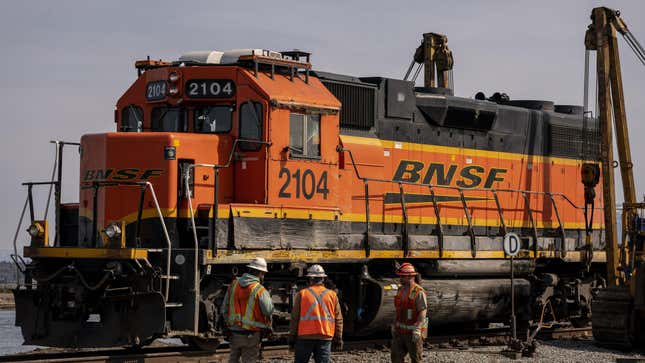
Congress forced a contract on rail unions last year that held no guaranteed sick leave for workers. After months of bad publicity, big rail companies announced Monday the are finally, sort of, approaching doing the right thing.
The freight rail lines BNSF, CSX, Norfolk Southern, and Union Pacific have granted a whole four days of sick leave to almost half of their 93,000 workforce, with the option to use three vacation days as sick days.
How generous. Apparently, it took lobbying directly from the president’s office to convince the railroads to grant even those few sick days after Congress forced a contract on workers without them to prevent a strike. From The Guardian:
“We’re very happy about this. We’ve been trying to get this for decades,” said Artie Maratea, president of the Transportation Communications Union. “It was public pressure and political pressure that got them to come to the table.”
When Joe Biden and Congress enacted legislation in December that blocked a threatened freight rail strike, many workers angrily faulted Biden for not ensuring that the legislation also guaranteed paid sick days. But since then, union officials says, members of the Biden administration, including the transportation secretary, Pete Buttigieg, and labor secretary, Marty Walsh, who stepped down on 11 March, lobbied the railroads, telling them it was wrong not to grant paid sick days.
“We’ve made a lot of progress,” said Greg Regan, president of the Transportation Trades Department of the AFL-CIO, the main US labor federation. “This is being done the right way. Each railroad is negotiating with each of its individual unions on this.”
“The rail companies,” he added, “miscalculated about how the public would see their huge profits and the stories of how hard rail workers’ lives were and not having sick days and the draconian policies they were operating under.”
It’s still not perfect: CSX granted sick days to only 61 percent of its 17,000 workers. Norfolk Southern granted sick days to 46 percent and BNSF only 36 percent. Of the 12 unions operating within railroads only eight have reached a deal with the companies.
I’ll give you one guess as to which workers these railroads cut out of the deal:
“The railroads went to the non-operating crafts first and cut a deal with them,” said Mark Wallace, first vice-president of the Locomotive Engineers and Trainmen. “If a carman [who inspects and repairs railcars] has to call in sick and doesn’t come to work, the train will still run. If the engineer or conductor has to call in sick, the train is probably not going to go that day.”
Unions such as the Brotherhood of Locomotive Engineers and Trainmen were the ones holding up contract negotiations last year in order to secure a safer work environment and better quality of life for their members. Line workers still have no path to sick days off without scheduling weeks in advance (which isn’t exactly how sickness operates) while being responsible for some of the most dangerous jobs in the business. When the few workers still running the trains are either tired or sick on the job, that’s when mistakes happen.
While the White House is busy patting itself on the back, this is likely more of a PR move than anything else. Especially considering rail’s disastrous start to 2023 with derailments and dangerous trains all after years of record profits—and record stock buybacks. Rail companies achieved these record profits using a strategy of longer trains, less maintenance, and skeleton crews. The Norfolk Southern train that derailed in East Palestine, Ohio, earlier this year had only three people aboard a 149-car train with 11 cars hauling toxic substances, according to the National Transportation Safety Board.